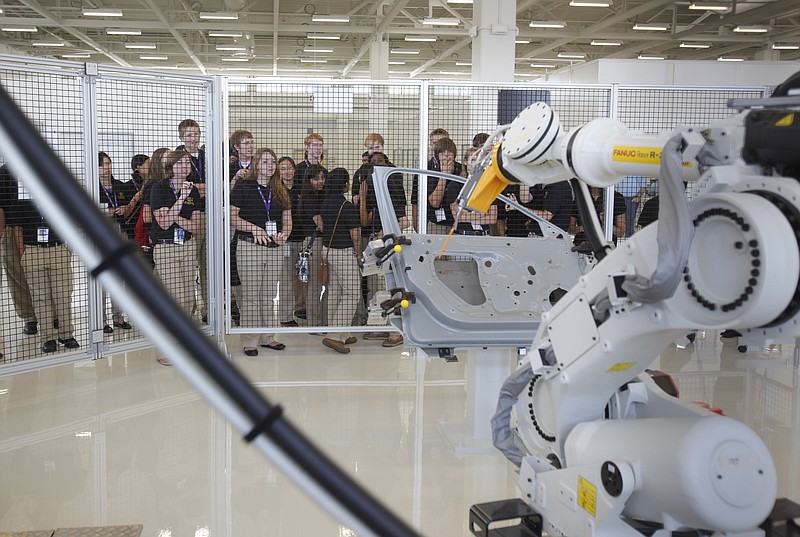The Tennessee congressional district that includes Chattanooga is among the worst 10 percent nationally in the share of youth who are neither in school nor employed, according to a new study.
The Social Science Research Council study indicated that 19.3 percent of those between ages 16 and 24 in the 3rd District are not working or in school - what the report called "disconnected youth."
Congressional districts
Disconnected youth in select congressional districts and percent:1. Wisconsin, District 2, 4.9 percent2. Nebraska, District 2, 5.4 percent74. Georgia, District 6, 9.8148. Tennessee, District 7, 12 percent393. Tennessee, District 3, 19.3 percent431. Tennessee, District 9, 22.9 percentSource: Social Science Research Council
Metro areas
Disconnected youth in select metro areas and percent:1. Omaha-Council Bluffs, NE-IA, 7.7 percent2. Bridgeport-Stamford-Norwalk, CT, 7.7 percent42. Nashville-Davidson-Murfreesboro-Franklin, TN, 12.8 percent69. Atlanta-Sandy Springs-Roswell, GA, 14.9 percent84. Chattanooga, TN-GA, 16.8 percent87. Knoxville, TN, 17.5 percent98. Memphis, TN, 21.6 percentSource: Social Science Research Council
That percentage put the 3rd District, which stretches from Hamilton County to Scott County on the Kentucky border, as the 393rd worst among the nation's 436 congressional districts, the study showed.
Kristen Lewis, a study co-author, said that both youth and society pay a price for the disconnection.
"For [youth], this time really costs them for the rest of their lives," she said. Rather than learning habits of successful adults, the youth are getting depressed, socially isolated and not making good decisions, Lewis said.
"It's in everyone's interest to reach out and find a way to engage them," Lewis said.
Tennessee's 9th Congressional District, which includes Memphis, was worse than the 3rd District. It came in at 431 with 22.9 percent of disconnected youth, according to the report titled "Zeroing In on Place and Race."
In terms of the nation's largest 98 metropolitan areas, Chattanooga ranked the 84th worst at 16.8 percent. That was better than metro Knoxville and Memphis but behind Nashville.
Nationally, 13.8 percent of youth are disconnected, according to the study that used U.S. Census Bureau data. While the report looked at race, there were no numbers for Chattanooga because of a small sample size.
Other key findings include:
* At the national level, youth disconnection rates for blacks (21.6 percent), Native Americans (20.3 percent), and Latinos (16.3 percent) are markedly higher than rates for Asian Americans (7.9 percent) or whites (11.3 percent).
* In highly segregated metro areas, black youth tend to have higher-than-average rates of disconnection, whereas white youth tend to have lower-than average rates of disconnection. In other words, residential segregation by race disproportionately harms black teenagers and young adults, according to the study.
Lewis said Tennessee Promise, the new community college scholarship program started by Gov. Bill Haslam, "sounds like a great idea" to engage young people.
A lot of disconnected youth come from poorer areas, and the cost of college seems daunting, said Lewis, who conducted the study for the nonpartisan Measure of America project for the nonprofit Research Council.
"This idea of we'll make it free is a tremendous boost to those young people and will help them overcome that psychological hurdle," she said.
Lewis also said a healthier economy and increased numbers of jobs in a community is helpful, especially if there's a concerted effort in schools to find out what skills employers need and graduating youth with those levels.
Bill Kilbride, who heads the Chattanooga Area Chamber of Commerce, said recent company announcements about the creation of more than 1,000 auto supplier jobs is an opportunity for young people.
"We're doing everything we can to help with workforce needs," he said. "It's a great opportunity certainly for young people to put their feet in an industry that's growing and continuing to grow."
Bill Fox, who heads the University of Tennessee's Center for Business and Economic Research, said the best part of the Chattanooga area labor force will wind up with the most attractive new supplier jobs.
That will place a demand locally to bring up the workers who are below that level, he said.
Lewis said that disconnected young people are not "an appealing, cuddly group."
"They make a lot of bad decisions," she said.
Many middle-class teens are protected from bad decisions by parents, teachers or neighbors and have much more support, Lewis said.
"A lot of these [disconnected] kids don't have that," she said. "As a society we really need to step in."
Contact staff writer Mike Pare at mpare@timesfreepress.com or 423-757-6318.
